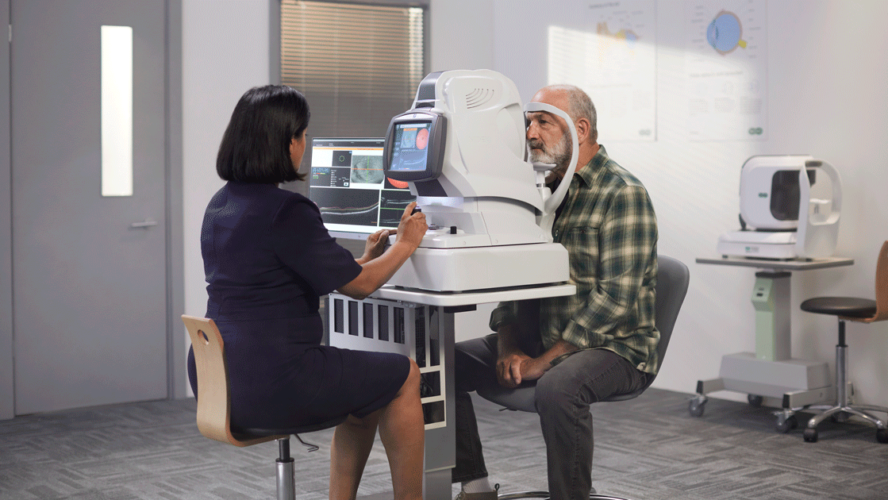
Giles Edmonds
Clinical Services Director, Specsavers
Up to 50% of sight loss is avoidable, and we believe that nobody should have to live with vision loss that could have been avoided.
This National Eye Health Week, we, at Specsavers, are encouraging everyone to have regular eye tests to keep on top of their eye health. We think the best eye care should be available to everyone, that’s why there are advanced eye scanners in our stores nationwide.
Getting your eyes checked
Optical coherence tomography (OCT) scanners allow opticians to take a 3D image of the back of your eye to help spot serious eye conditions up to four years earlier.
Some of the conditions which can be picked up earlier with the scan include glaucoma — which is often symptomless — macular degeneration and diabetic retinopathy. In rarer cases, signs of other serious health issues such as brain tumours have been found.
This is what happened to dad-of-two Matthew Voice, 40, who had been suffering from blackouts and dizzy spells for seven years when he first went for an eye test at his local Specsavers.
Detecting eye conditions
Matthew’s doctors had put his symptoms down to high blood pressure, but he was convinced something else was wrong.
He went for an eye test in 2020, during the first lockdown. He was seen by optometrist Denis Youngman who was concerned by the symptoms Matthew described.
Denis said: “He complained of a number of odd symptoms, which led to an A&E admission a few days earlier. A&E made a routine referral to neurology, which would have had him waiting for weeks. However, I felt his case warranted an urgent in-store examination.”
Doctors said if I hadn’t gone, I might not be here today.
Benefits of an OCT
As part of the examination, Matthew had an OCT eye scan which highlighted that his optic nerves were swollen. His vision was also reduced, so Denis referred him immediately to the ophthalmology department at Southlands Hospital.
Doctors at the hospital discovered Matthew had a brain tumour, and he was eventually diagnosed with brain cancer. Chemotherapy and radiotherapy mean the cancer is under control, but it isn’t cured.
“I very nearly didn’t go to the appointment because we were in the middle of lockdown, but I knew I had to go – something just wasn’t right,” recalls Matthew.
“Doctors said if I hadn’t gone, I might not be here today. I want everyone to know that eye appointments are about so much more than just checking your sight.”
Does an OCT hurt?
No, not at all. It is a quick, painless procedure. Just like having a photo taken.
Does it take long?
No, the scan itself will take a matter of seconds.
How much does it cost?
An OCT scan is in addition to your eye test and carries a small fee of £10.
What do I get from having this scan?
Even if your optician does not find any health concerns, we can use your OCT scans to see the change in your eye health over time, allowing your optician to identify concerns much faster.
Who should have an OCT scan?
Even if your vision and eye health are fine, an OCT scan is recommended for anyone aged 25 and over. Getting an OCT scan with your eye test helps to track your eye health over time.




